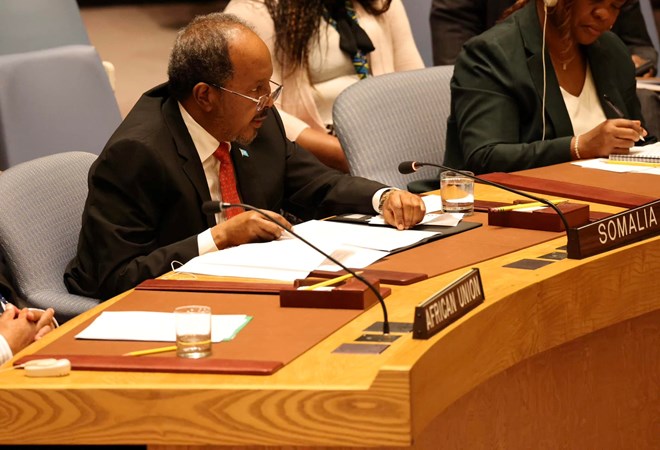
Ahmed Mohamed
Saturday June 24, 2023

MOGADISHU, SOMALIA — Somalian President Hassan Sheikh Mohamud has urged the U.N. Security Council to lift an arms embargo on the nation, saying it no longer serves its purpose.
Some analysts, however, say Somalia is still struggling to ensure arms meant to provide security don't end up in the hands of terrorists.
Mohamud told the Security Council on Thursday that his government had put in place sufficient measures to counter the illicit flow of arms. He said the government had established legislation to control the possession, manufacture, storage and use of firearms.
“I implore you distinguished delegates to support our call for the complete lifting of the arms embargo in Somalia," he said. "By doing so, you will empower us to assert our sovereignty, effectively combat terrorism and build a peaceful and prosperous future for our nation.”
He noted the situation in Somalia had improved significantly, adding the Somalia of 2023 is not that of 1992, when the Security Council imposed the arms embargo.
Call for international help
Mohamed El-Amine Souef, chief of the African Union Transition Mission in Somalia (ATMIS), echoed calls to lift the embargo. He noted there was a need for concerted international efforts to protect gains made over the years and ensure sustained pressure against al-Shabab.
“We must support SSF [Somalia Security Force] leadership, hold liberated areas and take over FOBs [forward operating bases]," he said. "These forces require resources to fight al-Shabab and stabilize newly liberated areas. This calls for the lifting of the arms embargo on Somalia.”
Somalia is in the middle of a military operation against al-Shabab. The federal government has said it is on course to launch the second phase of the offensive dubbed Operation Black Lion. Unlike the first phase, which involved the Somali army and clan militia, the second phase will enlist the support of additional troops from Ethiopia, Kenya and Djibouti following an agreement among the countries in January.
Matt Bryden, chairman of Sahan, a policy and security research organization on the Horn of Africa, said that while the lifting of the embargo would be a positive step for Somalia as it tries to affirm its sovereignty, there is no concrete evidence it will change the security dynamics in the country.
“It's not clear that lifting the arms embargo would actually change the situation or allow the government to improve its military position," he said. "There are already exemptions for the government to receive military assistance, and there are only a few remaining restrictions on the types of weapons that it can procure.”
Skepticism on lifting embargo
Bryden said the Somali government couldn't afford high-caliber weapons, even if the embargo was lifted. He added that despite the expression of opposition to the embargo by countries such as Kenya and Ethiopia, they remain apprehensive that weapons could still fall into the wrong hands. He noted that even at the Security Council, where Africa is represented by three countries, the position of the African Union is still against the removal of the embargo.
“I think the concerns of regional countries, the neighbors, Somalia's neighbors, about lifting the arms embargo are principally that the federal government doesn't control either the land borders or the maritime borders of Somalia," he said. "And so, there is a concern that weapons would continue to enter Somalia freely, as they do even under the terms of the arms embargo.”
Samira Gaid, an independent security analyst in Mogadishu, told VOA the removal of the arms embargo was more critical at the moment, as Somalia battles al-Shabab militants.
“The country is in war against a terror group. It needs all the capacities that it can achieve to take on this group and fight this group and eliminate it from Somali territory," she said. "So, the prevailing situation, really security situation, argues for a lifting of this arms embargo.”
But Gaid said the Security Council was not likely to lift the embargo soon. She argued that unless a clear road map was developed between Somalia and the council, the embargo would still be in place for some time.
Political questions
Analysts also have raised concerns about political disputes in Somalia and how they could work against an appeal for the lifting of the arms embargo.
Ismail Omar Dalmar, a political analyst with Linking Governance, a policy strategy consultancy in Mogadishu, said that while Mohamud has expressed a political will, political disputes, especially in Puntland and Somaliland, could undermine the president’s plea to the Security Council.
The council imposed the embargo on Somalia in 1992 following the collapse of the central government and subsequent civil war. In March 2013, the council, through Resolution 2093, relaxed the embargo to allow the Somali government to acquire a specific caliber of weapons for the development of its security forces and protection of its citizens.
The embargo, now in its third decade, has been described as the longest-running arms restriction in the history of the Security Council.